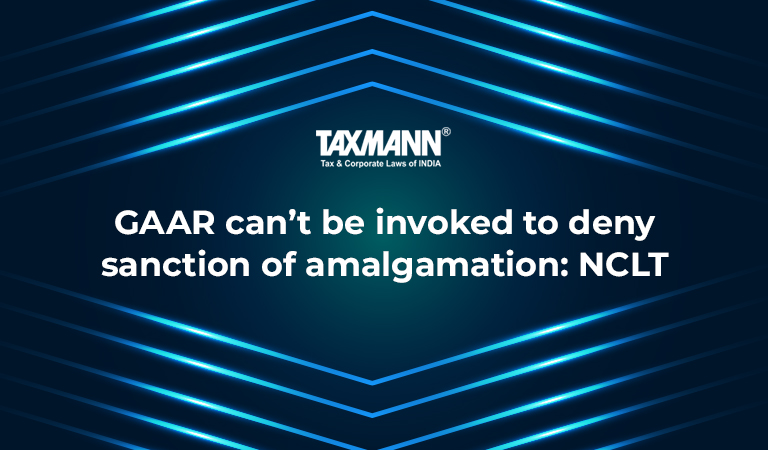GAAR can’t be invoked to deny sanction of amalgamation: NCLT
- Blog|News|Income Tax|
- 2 Min Read
- By Taxmann
- |
- Last Updated on 1 June, 2022

Case Details: Panasonic India (P.) Ltd. In re - [2022] 138 taxmann.com 570 (NCLT-Chd.)
Judiciary and Counsel Details
-
- Harnam Singh Thakur, Judicial Member & Subrata Kumar Dash, Technical Member
- Ajay Vohra, Sr. Adv. Nesar Ahmad & G.S. Sarin for the Petitioner.
- Yogesh Putney, Sr. Standing Counsel & Harveet Singh Sehgal, Adv. for the Respondent.
Facts of the Case
A joint second motion application filed by Petitioner Companies namely; Panasonic India Private Limited and Panasonic Life Solutions India Private Limited under Section 230-232 of the Companies Act, 2013 and other applicable provisions of the Act read with Companies (Compromises, Arrangements, and Amalgamations) Rules, 2016.
The Petitioner Companies had prayed for sanctioning of the Scheme of Amalgamation between the respective companies.
The Income-tax Dept. had filed its report contending that the Scheme of Amalgamation is not at arm’s length and could not be termed as a prudent acquisition on any commercial or business terms and the entire benefit accrued to one company only i.e. M/s Panasonic Corporation, Japan. It was further stated that the merger is nothing but a vehicle to transfer accumulated losses eligible for set off from Transferor to Transferee Company which would attract General Anti Avoidance Rules and the provisions of Section 96(1) of the Income Tax Act, 1961.
However, the applicants submitted that the provisions of GAAR are not applicable as the amalgamation “is not an impermissible avoidance arrangement” and its main purpose is not to obtain a tax benefit.
NCLT Held
The National Company Law Tribunal held that the Scheme of Amalgamation contemplated between the petitioner companies appears to be prima facie in compliance with all the requirements stipulated under the relevant sections of the Companies Act, 2013.
The provisions of sections 72A and 79 of the Income-tax Act are sufficient to protect the interest of revenue in any case of any carrying forward and set off of accumulated loss/unabsorbed depreciation. If any issues come up for the consideration of the Assessing Officer at the time of assessment of the petitioner companies, he can analyze the Scheme and is entitled to take any decision as per the provisions of the Income Tax Act.
As regards the provision of GAAR, AO has the liberty to invoke the provisions if, during assessment or reassessment proceedings, he believes that GAAR should be invoked. Thus, the objections raised by the Income-tax Department had no merits with regard to the proposed Scheme of Amalgamation.
Disclaimer: The content/information published on the website is only for general information of the user and shall not be construed as legal advice. While the Taxmann has exercised reasonable efforts to ensure the veracity of information/content published, Taxmann shall be under no liability in any manner whatsoever for incorrect information, if any.

Taxmann Publications has a dedicated in-house Research & Editorial Team. This team consists of a team of Chartered Accountants, Company Secretaries, and Lawyers. This team works under the guidance and supervision of editor-in-chief Mr Rakesh Bhargava.
The Research and Editorial Team is responsible for developing reliable and accurate content for the readers. The team follows the six-sigma approach to achieve the benchmark of zero error in its publications and research platforms. The team ensures that the following publication guidelines are thoroughly followed while developing the content:
- The statutory material is obtained only from the authorized and reliable sources
- All the latest developments in the judicial and legislative fields are covered
- Prepare the analytical write-ups on current, controversial, and important issues to help the readers to understand the concept and its implications
- Every content published by Taxmann is complete, accurate and lucid
- All evidence-based statements are supported with proper reference to Section, Circular No., Notification No. or citations
- The golden rules of grammar, style and consistency are thoroughly followed
- Font and size that’s easy to read and remain consistent across all imprint and digital publications are applied



 CA | CS | CMA
CA | CS | CMA
